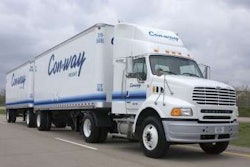Truck power solutions could once again become diverse.
It’s spring as I write this. March winds are gusting out of the West. One minute it looks like rain, the next there’s not a cloud in the sky. Temperatures are hovering in the mid-70s, and there’s a hint of green in the trees. Another sure sign that summer is on the way: Fuel prices are beginning to creep upward as fuel blends change and the annual “driving season” draws near.
Given the current state of the economy, a sudden return to $4 and $5 fuel prices almost certainly would worsen our current precarious financial situation and pretty much kill off any short-term hopes of a recovery. Maybe for those reasons and many others, OPEC will take it easy on us this year; triggering a worldwide depression might be a bit much, even for them.
Still, it’s likely not a matter of if fuel costs will rise again. And although a myriad of external factors can wreck havoc with oil prices, we’d all do well to remember that simple greed can play a part as well. As T. Boone Pickens noted during an address to attendees at the National Truck Equipment Association’s Work Truck Show in Chicago last month, the price of oil at the time of his presentation was $44 a barrel. But he believes the Saudis want at least $75 a barrel and soon will begin manipulating production to get it. If Pickens is right, then we’re in for a long, hard summer.
Walking around the Work Truck Show floor, I was struck by how the trucking industry has been thrown into a sudden state of flux by the down economy and last year’s fuel price spikes. Booths on the show floor showcased every conceivable new technology available today, and almost all of it was predicated on decreasing or even eliminating fossil fuel costs for trucking companies. There were electric trucks, electric-gas hybrids, diesel-electric hybrids, liquid natural gas-burning trucks, compressed natural gas trucks, trucks that ran on fuel cells, and a whole host of support technologies designed to lower a fleet’s dependence on traditional fuels.
As a journalist, it’s probably the most exciting time to be covering the trucking industry since the truck itself was invented. One hundred years ago, nobody knew exactly what a truck was, how it should look or how it should be powered. There were electric trucks, diesel-powered trucks, steam-powered trucks (a technology that has yet to reappear) and gasoline-powered trucks. It’s worth noting that Henry Ford originally designed his Model T to run on kerosene, since that’s what most farm tractors were using at the time.
But while all of the emerging technologies might be interesting academically, they must be positively maddening for fleet managers. After all, they’re the ones who have to wade through all the chaff and find a winning solution for their companies. That task seems to be getting tougher, as it appears we may not arrive at a one-size-fits-all solution the way we did a century ago with the internal combustion engine. Trucking may become a highly diversified and specialized industry as fleets with highly differing application demands settle on new technologies that work for their particular business models.
Now, more than ever, it’s important to be both educated and open-minded if you’re running a fleet operation. A lot of things being touted today may turn out to be technological dead ends. Other pricey solutions may work well but leave us longing for the days of diesel and powerful big-liter engines. Fleet managers who are contemplating these changes and willing to act now and experiment will be at the forefront. These changes aren’t going to be easy or cheap to confront, but there’s probably no way around them. Be bold and learn what works best for your operation.










